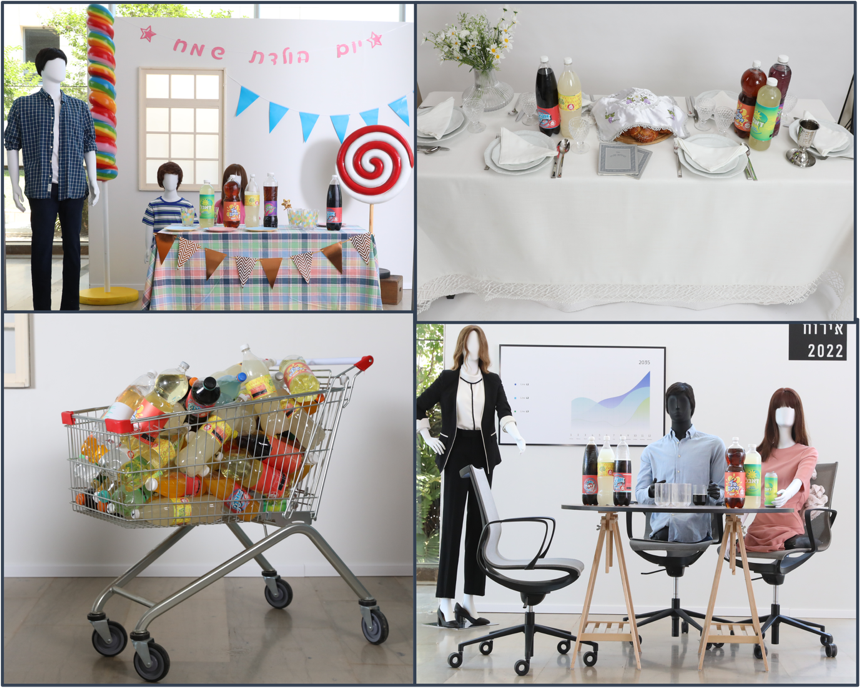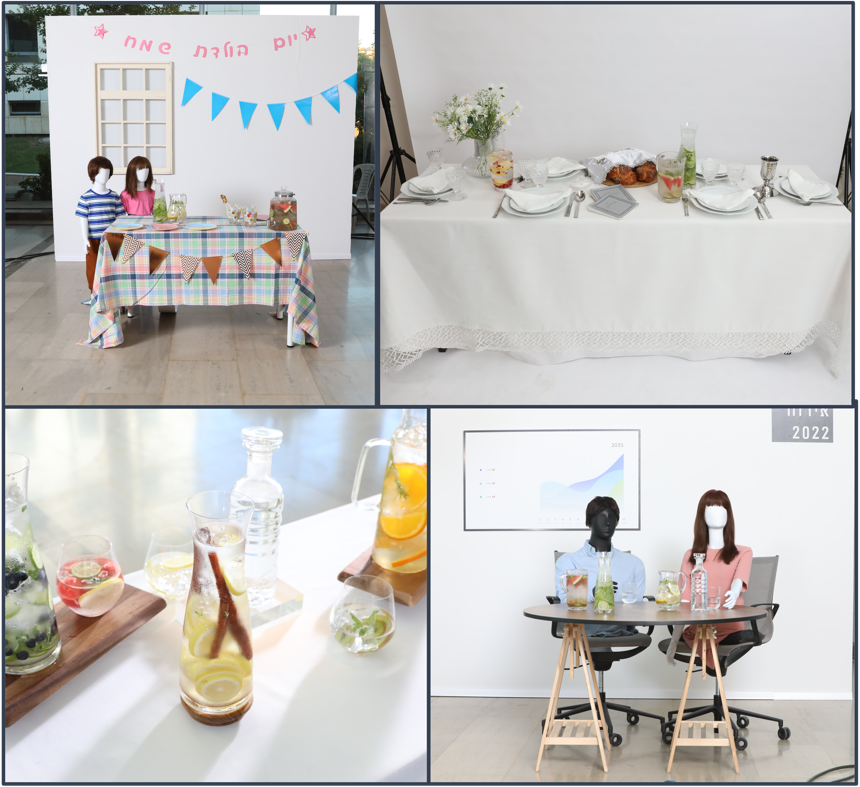
We are exposed to sweetened beverages wherever we are. Not only in a supermarket, in a restaurant or a convenience store, but also during happy occasions, events at work, social gatherings, holidays, the Shabbat meal, work meetings, conferences, public events and more.
Sweetened beverage sale and vending machines can be found even in hospitals, sports venues, community centers and educational institutes.

Hospitality habits that harm the health of the guests: the "uncomfortable" era
The sweetened beverages appear in many colors, textures and flavors. Carbonated drinks, juices, "nectar" with a subtle sweetness ,and "diet" drinks are marketed in all sizes: large bottles of 1.5 liters or even 2 liters, individual bottles and small cans.
Despite the growing awareness of the damage caused by sweetened beverages – obesity, cardiovascular diseases, diabetes, fatty liver and many other diseases – serving sweetened and sugary beverages has become a norm. Sweetened beverages are served in every place of accommodation, and so people who do not even think of drinking a sweetened beverage and do not want their children to drink are exposed to temptation.
Sometimes even those who do not drink sweetened beverages regularly feel the need to follow this norm and serve sweetened beverages to their guests.
It seems that the roots of the custom are part of human nature and the desire to be a good and generous host at every event: holidays, the daughter's birthday, an important meeting with investors from abroad. Even while waiting for an appointment at the hospital. Sweets in general and sweetened beverages in particular are perceived as something "indulgent", delicious and satisfying. We worry that if we do not entertain with a variety of sweets and sweetened beverages and only water is available, our guests will consider it stingy. however, most people prefer not to be served sweet drinks.
In addition, there are parents who think that children would not drink water and therefore it is better to sweeten it. So as they try to make sure the children drink enough, the children get used to drinking sweetened water. However, children can get used to water and drink it willingly.
How much sugar is involved?
Each 100 ml of sweetened bevearge contains about 2.4 teaspoons of sugar!
- One can (330 ml) contains about 8 teaspoons of sugar.
- One glass (200 ml) contains about 5 teaspoons of sugar.
- One small bottle (500 ml) contains about 12 teaspoons of sugar.
- One large bottle (1.5 liters) contains about 30 teaspoons of sugar.
Israelis drink sugar
In a recent survey (2022) before the campaign of the Ministry of Health, idrinking a sweetened or diet drink on a weekly basis (at least once a week) was reported by 76% of the general population, 84% of the Haredi sector and 85% of the Arab sector.
Parents reported about children aged 3 – 18. 61% of the general population, 66% from the Haredi sector and 79% of the Arab sector reported that their children drink at least once a week a sweetened or diet drink (with lower percentages of consumption of diet drinks: 18% of the general population, 12% of the Haredi sector and 20% of the Arab sector).
Daily sugar consumption among those who drink sweetened beverages
From national health and nutrition surveys in 2014-2016, the Ministry of Health:
It was found adults consume 77.5 grams of added sugar per day – about 19 teaspoons of sugar per day.
Of these, 48.8 grams of sugar comes from sweetened beverages – over 12 teaspoons a day.
That is, 67.1% of the added sugar comes from sweetened beverages!
It was found children consume 57.4 grams of added sugar per day – about 14.3 teaspoons of sugar per day.
Of these, 31.1 grams of sugar that comes from sweetened beverages – over 7.7 teaspoons of sugar a day.
That is, 54.9% of added sugar comes from sweetened beverages!
The adults and children in Israel who drink sweetened beverages consume an amount of sugar at least twice higher than the recommended amount, and sweetened beverages contribute the most to the added sugar intake.
In 2019, a national health and nutrition survey was conducted for preschoolers. The alarming data show that among infants aged 9 months to one year, 15% of infants in the Jewish sector drank a sweetened beverage the day before the survey, and the same was reported about 60% of infants in the Arab sector!
Did you know?
The sugar consumed through a drink causes a higher and faster increase in blood sugar levels and a faster decrease in insulin levels compared to that consumed through solid food.
Exposure to advertising encouraging to drink sweetened beverages
We are exposed to a huge number of advertisements of sweetened beverages. Many studies in recent years discuss the significant influence advertising has on decision making. Advertising has an effect on consumption among people in general and especially among children and adolescents.
More than NIS 35 million was spent on soft drink advertisements in January-May 2022 alone (sweetened beverages, energy drinks and diet drinks) in the written (press and billboards), broadcast (radio and television) and digital (websites and social media) media (data published by Ifat MI Advertising Control). This expenditure is the highest in the advertising sector and accounts for 25.3% of the total advertising expenses in all food categories.
Most Israelis know how unhealthy sweetened beverages are and want to make a change
In a recent survey (2022) before the Ministry's of Health campaign, it was found that 85% of the general population agree that sweetened beverages harm health – it increases the risk of diabetes, fatty liver, cardiovascular diseases and cancer. Awareness of the negative effect of sweetened beverages is lower in the Arab sector and the people who define themselves Haredi – 69% and 78% respectively.
In addition, the survey shows that 65% agree that diet drinks harm health and 55% agree that drinks sweetened with sugar and sugar substitutes have a negative effect on the environment.
70% of the respondents want to be served water instead of sweetened beverages and 70% expressed willingness to host without sweetened beverages and serve healthy drinks (water, water with mint, etc.). Of these, 80% of the general population as well as the Arab sector support changing the hospitality norms, while in the Haredi sector the rate is high, but lower than 60%.
The respondent indicated the factors that may help them reduce the consumption of sweetened beverages:
- 46% stated: there should be tastier substitutes for the sweetened drinks.
- 37% stated: there should be a health reason for this and there should be no obligation not to serve sweetened beverages.
- 37% stated: there should be access to cold water in public places and workplaces.
- 28% stated: the new norm in their community should be serving water to guests on holidays and events.
- 25% stated: in their environment there should be less exposure to sweetened beverages.
- 17% stated: the price of the sweetened beverages should go up.
- 9% stated: there should be less demand from the children for these drinks.
Parents indicate that the factors that should get children to reduce the consumption of sweetened beverages are parental role models who do not drink sweetened beverages and setting limits. Other mentioned factors are the exposure to such beverages in the environment of the children, including educational institutes.
The proposals arising out of the survey refer to a change in the physical and social environment – for instance, reducing exposure to sweetened beverages and increasing exposure to water through an environmental change and changing the social norm.
Leave the "uncomfortable" behind and drink water
Over 70% of the respondents state that when they visit others, they prefer to drink water!
More and more people want to serve water and leave sweetened beverages behind. More parents want their children not to be exposed to harmful drinks and to drink water. This is the new norm. It is indulging and better for our health and the environment.
Diverse and colorful suggestions
- Jugs of water with extras: mint, lemon or orange slices, sliced fruits, herbs such as lemongrass, lemon balm, geranium and more.
- Jugs of water with ice cubes and with sliced fruits or frozen grapes that are used as ice cubes.
- You might try this with cold soda water.
Your guests will appreciate it and value your concern for their health. Your table will look colorful and healthy.

Video: sugar-sweetened beverages? water only! (with Hebrew captions)
Avoiding sugar-sweetened beverages - Chazak - video for the Haredi sector (with Hebrew captions)
Further reading
Taxation of sweetened beverages – the Ministry of Health
Video: sweetened beverages contain a lot of sugar – the Ministry of Health
Findings of an online survey on the purchase of sweetened beverages (Hebrew)
Poster: Soft drinks, harsh cost (Hebrew)



